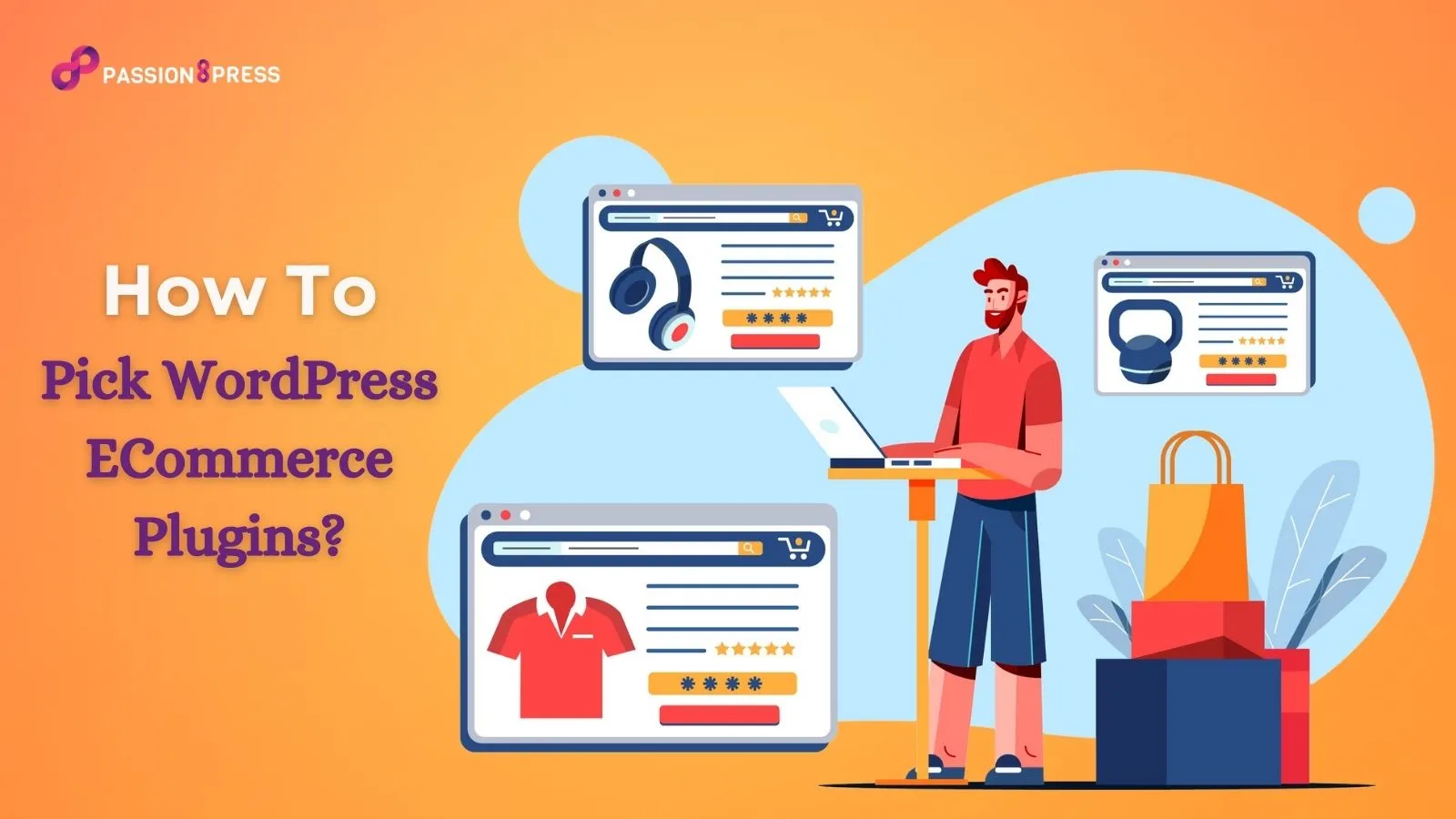As online shopping gains momentum, many retailers are eager to transition their business to the digital realm by creating eCommerce websites. Thanks to WordPress- even those without coding knowledge can develop their online stores.
These virtual shops often outperform traditional ones, presenting a lucrative opportunity for marketers. However, to ensure the smooth operation of your online store, selecting the right WordPress eCommerce plugins is crucial.
Surprisingly, there are over 50,000 plugins available to enhance your WordPress site. While the abundance of options is fantastic, choosing the wrong one can be a costly mistake, especially for eCommerce plugins that handle sensitive personal information.
Here, we’ll walk you through simple steps to help you choose the best WordPress eCommerce plugins. By the end, you’ll be well-equipped to create a secure and user-friendly online store that benefits both you and your customers.
But before you start creating a WordPress eCommerce website and start picking plugins, these are the things you must check:-
Listen To The Blog Post!
Things To Check Before Selecting WordPress eCommerce Plugin
Fast and Reliable Hosting
Even though there are many cheaper hosting plans available, it is crucial to prioritize speed when selecting a hosting service for your website. Opt for a provider that ensures better speed to enhance the user experience for your website visitors.
A website that takes less time to load not only improves user satisfaction but also presents an SEO opportunity. As you may already know, Google interprets fast-loading websites as a positive signal, potentially resulting in higher rankings than websites with slower loading.
Therefore, investing in a reputable web host becomes imperative. A reliable hosting service guarantees limited downtime, if any. Moreover, it offers high bandwidth to handle increased traffic more efficiently. This ensures that your e-commerce Website WordPress remains consistently accessible, minimizing the risk of missed sales opportunities.
Mobile Responsive Design
As of 2025, Statista predicts mobile commerce to constitute over 10% of U.S. retail sales. With a growing number of customers choosing mobile for online shopping, a responsive, mobile-friendly web design is essential.
Nowadays, ensuring a seamless shopping experience across desktops and mobile devices is paramount. While free WordPress eCommerce themes exist, investing in a premium theme is a wise choice.
It guarantees a visually appealing and functional design, adapting effortlessly to varying screen sizes for a consistent and satisfying user experience.
SSL Protection For Your Website
Security is a paramount consideration for any e-commerce website, given the sensitive personal and financial information it handles. So implementing SSL (Secure Sockets Layer) protection is a crucial step to ensure the security of your WordPress eCommerce website.
By redirecting URLs from HTTP to HTTPS, you enable SSL certificate (HTTPS protocol), creating a secure and encrypted connection between users’ browsers and your site. This encryption helps safeguard user data during transmission.
Beyond enhancing security, enabling HTTPS is a recommended practice for SEO. Google considers it as a ranking signal when determining the position of your website on the Search Engine Results Page (SERP).
SEO Capabilities
For developing a WordPress eCommerce store, you must ensure to have better SEO capabilities to rank your website on relevant keywords. Achieving a prominent position on Google search results for pertinent keywords unlocks the gateway to targeted traffic from actively seeking users.
This organic approach not only attracts potential clients but also ensures a cost-effective means of acquiring high-intent visitors. By strategically optimizing your website for search engines, you pave the way for a steady influx of interested users, enhancing the likelihood of conversions and sustained online success.
What To Look For In A WordPress eCommerce Plugin For Your Site?
When looking for the best plugin for your eCommerce website WordPress, you need to consider several factors based on your business needs, features requirements, support and updates, etc. Also, having a user-friendly plugin will make it easier to set up so that you don’t have to invest more time learning the technicalities of the plugin.
So here, we have figured out some of the most important factors to look at before opting for an eCommerce plugin for your WordPress site.
Support for Current WordPress Version:
Ensure that the WordPress eCommerce plugin is regularly updated to be compatible with the latest version of WordPress. Using outdated plugins can lead to security vulnerabilities and may result in compatibility issues. WordPress also issues warnings to those who attempt to download older versions of plugins, which haven’t been updated for more than 2 years.
Ease of Usage:
Opt for a plugin that is user-friendly and easy to navigate. A good WordPress eCommerce plugin should have an intuitive interface that allows you to manage products, orders, and other essential elements without a steep learning curve.
Impact on Page Speed:
Check whether the plugin is optimized for performance and does not significantly impact your site’s loading speed. Slow-loading pages can deter users and affect your search engine rankings, so choose a plugin that is well-coded and doesn’t compromise performance.
Flexibility & Customization:
Look for a WordPress eCommerce plugin that provides flexibility in terms of design and functionality. The ability to customize product pages, checkout processes, and overall site appearance is crucial for creating a unique and branded online store that meets your specific needs.
Further, you can hire WordPress developer services for plugin development or customize plugins to match your business needs, enhancing the website’s functionality and design.
Existence of Community:
A strong and active community around a plugin can be beneficial. Check if there is a community forum, support channels, or extensive documentation available. A vibrant community often means better support, timely updates, and a wealth of resources for problem-solving.
Support and Updates:
Regular updates are essential for security, bug fixes, and new features. Ensure that the plugin has a dedicated support team that provides timely assistance in case you encounter issues. A responsive support system is crucial for maintaining a reliable and secure WordPress eCommerce website.
Also Read
A Step-By-Step Guide To WordPress Plugin Development
How To Enable WordPress SSL Certificate For Ensuring Security?
How To Create An E-commerce Website In WordPress?
HTML vs WordPress: Which Is Better For You?
5 Best eCommerce Plugins For Your WordPress Website
Now you know about what are the features that you are looking for in your WordPress eCommerce plugin. The next step involves choosing between the various WordPress eCommerce plugins available that cater to your specific needs.
WooCommerce
WooCommerce stands out as the premier WordPress eCommerce plugin for its unparalleled user-friendliness and versatility in selling physical and digital products. Because of its seamless integration with various payment providers and scalability for any business size, it is one of the best eCommerce plugins for WordPress.
Moreover, it has a massive library of themes and extensions with free usage supported by a robust user community, which makes it the optimal choice for creating a customized and thriving online store.
BigCommerce
BigCommerce plugin is known for its scalability, catering to businesses of all sizes. With top-notch security features, it ensures data protection and compliance. Its multi-channel selling capabilities broaden market reach, while its SEO-friendly design boosts search engine rankings effortlessly, making it an ideal choice for diverse online businesses.
Shopify
Shopify is one of the most well-known WordPress eCommerce plugins that seamlessly blend its powerful selling tools with WordPress’s versatile content management. Its user-friendly interface simplifies setup for all users.
Robust security measures safeguard customer data, and 24/7 support minimizes downtime. However, due to its limited customization options, eCommerce retailers may feel constrained from creating an eCommerce WordPress website with highly custom user experiences.
Ecwid eCommerce Shopping Cart
Another premier WordPress shopping cart plugin is Ecwid, which offers seamless integration across websites, blogs, and social media. Its responsive design ensures a consistent shopping experience on all devices.
With features like unlimited backups, efficient inventory management, and mobile responsiveness, Ecwid provides a hassle-free solution. However, it has been noted that there are some limitations in their SEO offerings on the free plan.
Easy Digital Downloads
Easy Digital Downloads is also one of the top-tier WordPress eCommerce choices for digital wares. Crafted for efficiency, it delivers specialized features, an intuitive interface, and abundant extensions for added functionality. Perfect for eBook, digital art, or music ventures, it excels in simplicity, streamlining the management of digital goods effortlessly.
While Easy Digital Downloads excels in digital product sales, its specialization can be a drawback for those dealing with physical goods. Businesses in the latter category may find it limiting, requiring additional plugins or solutions to manage physical inventory. This potential need for extra tools may add complexity to the overall setup.
Conclusion
Choosing WordPress eCommerce plugins demands a thoughtful approach. Considering your product type and inventory, you might be looking for different plugins for your eCommerce site requirements.
While you should embrace user-friendly interfaces and extensions for enhanced functionality. Also evaluate scalability, community support, and compatibility with your business model to choose the right eCommerce plugin for your WP website.
Prioritize a seamless, customized shopping experience for your visitors so that you will be getting more traffic and conversion for your business. To conclude, you need to consider all of the above factors to ensure that your website is secure, fast, and user-friendly to deliver the best user experience possible.









